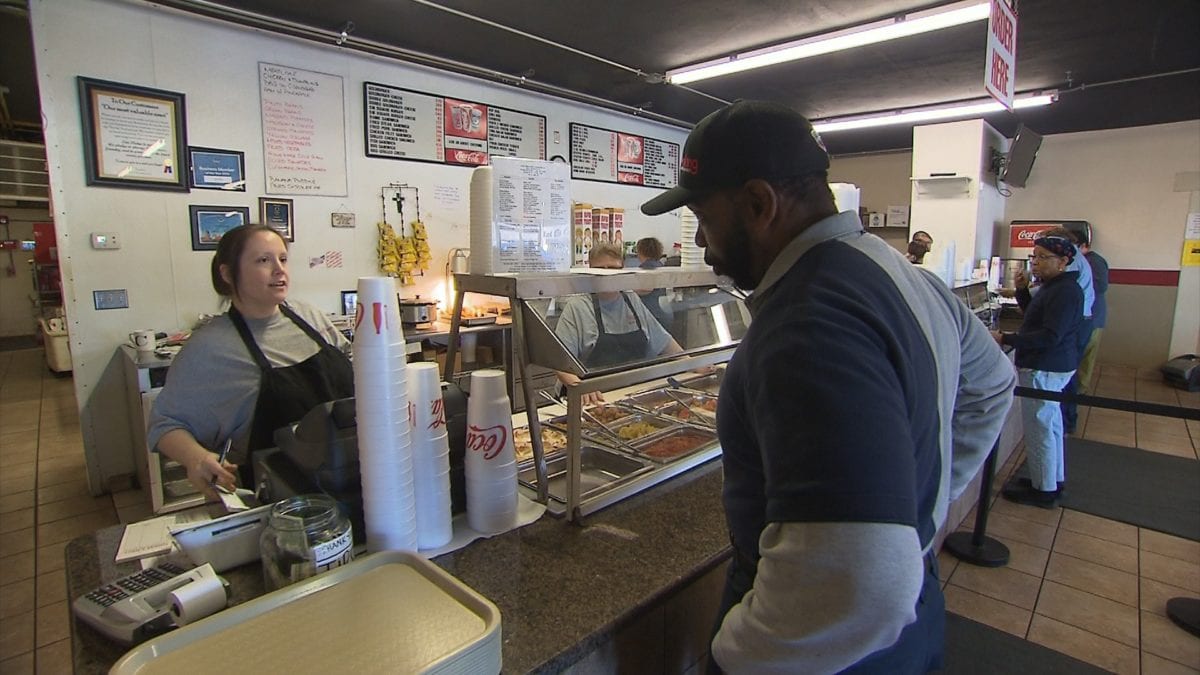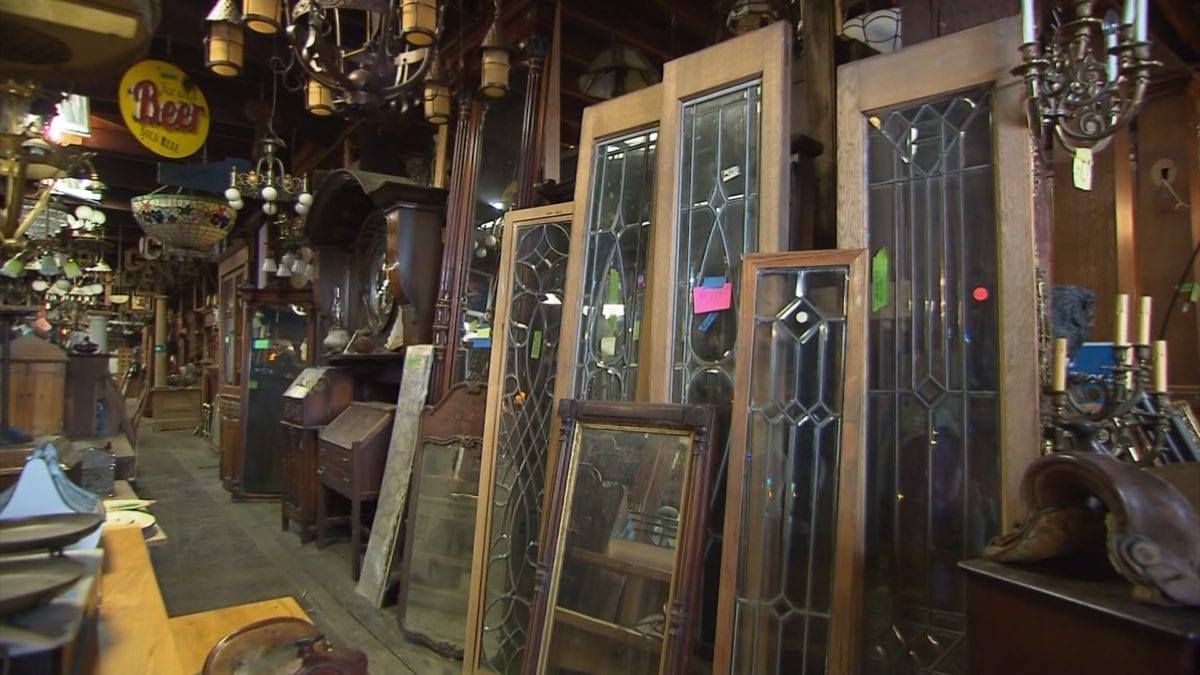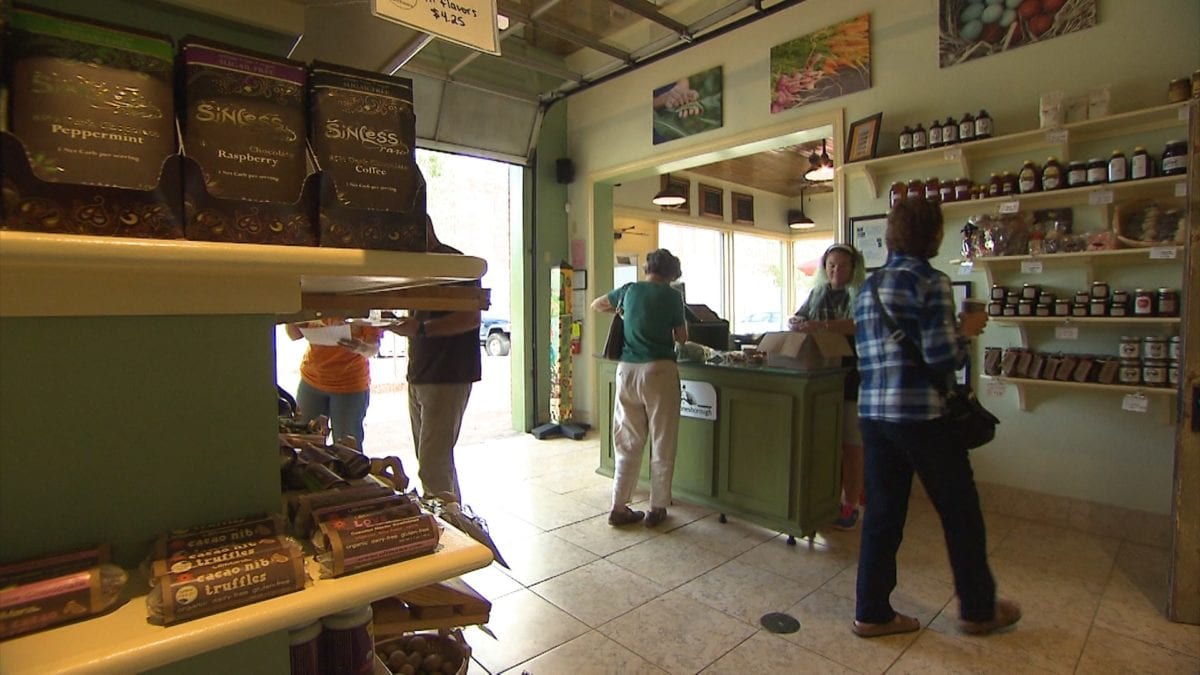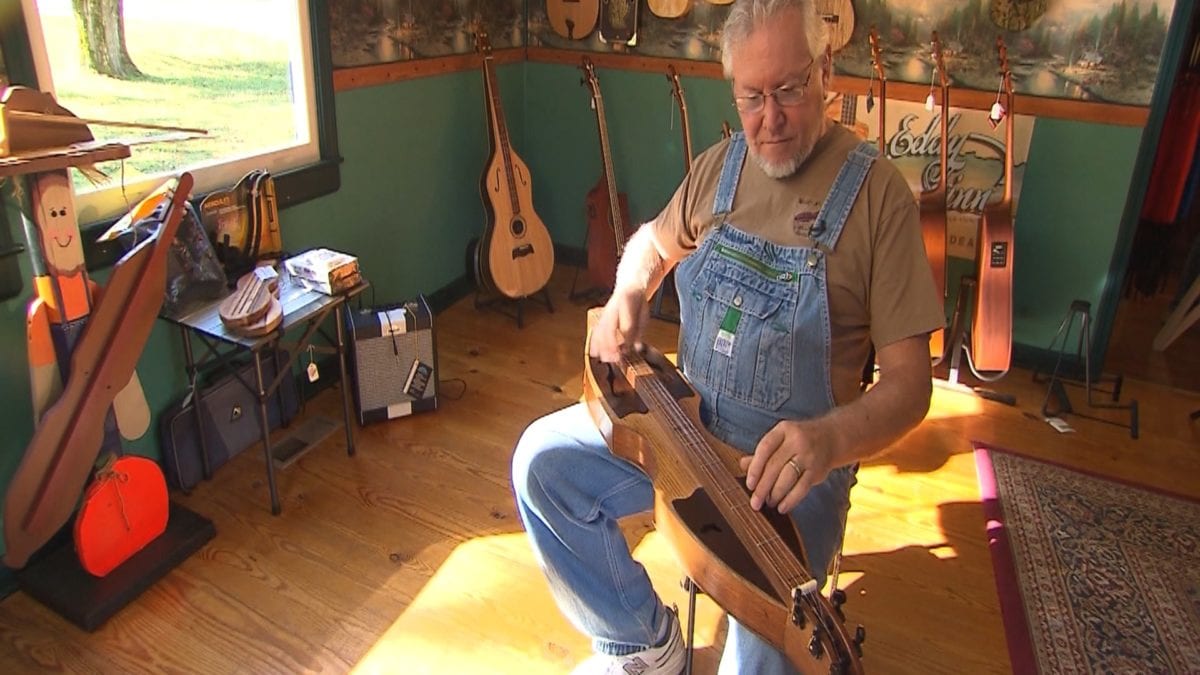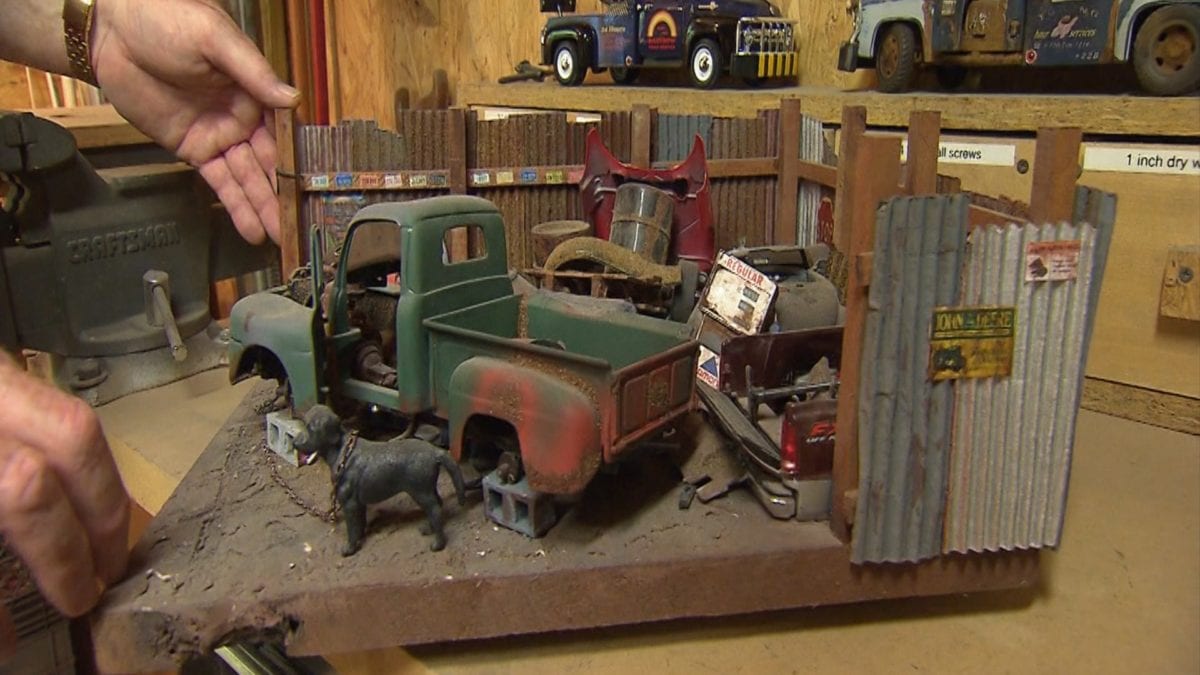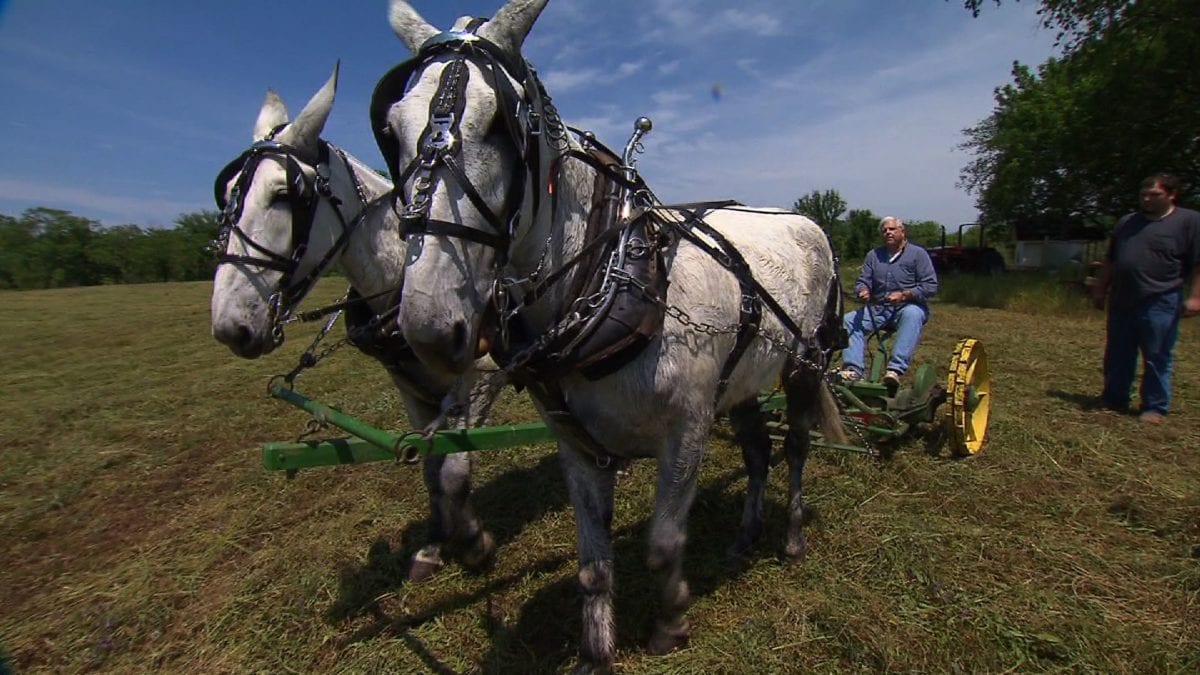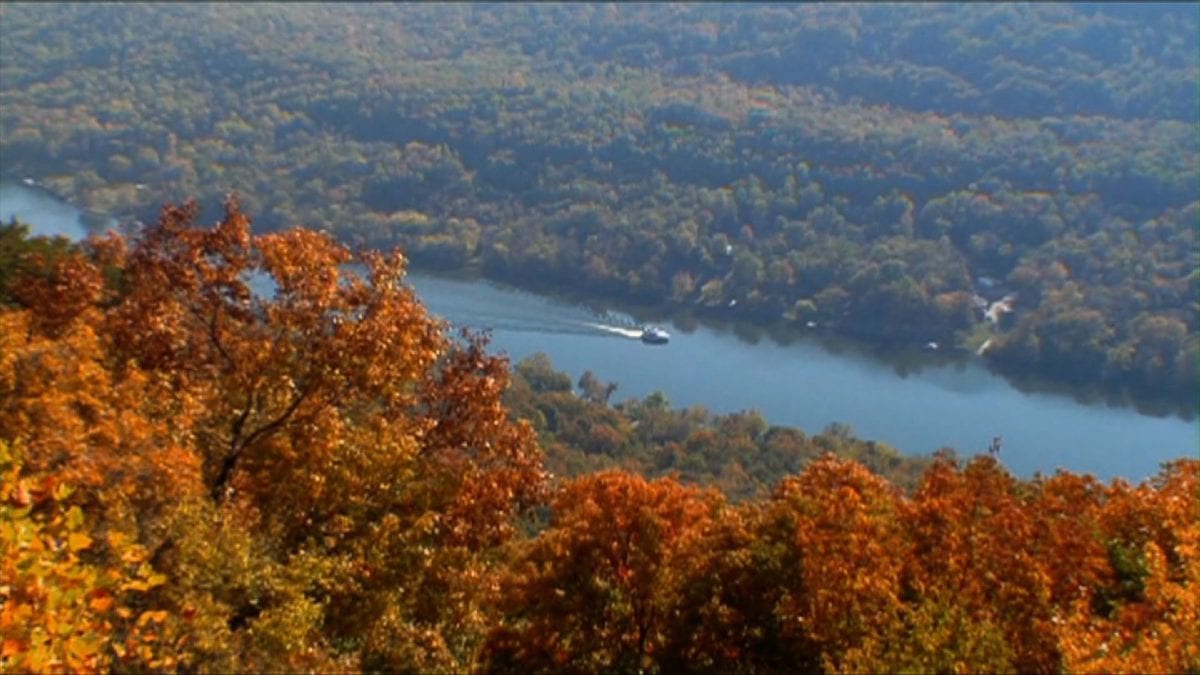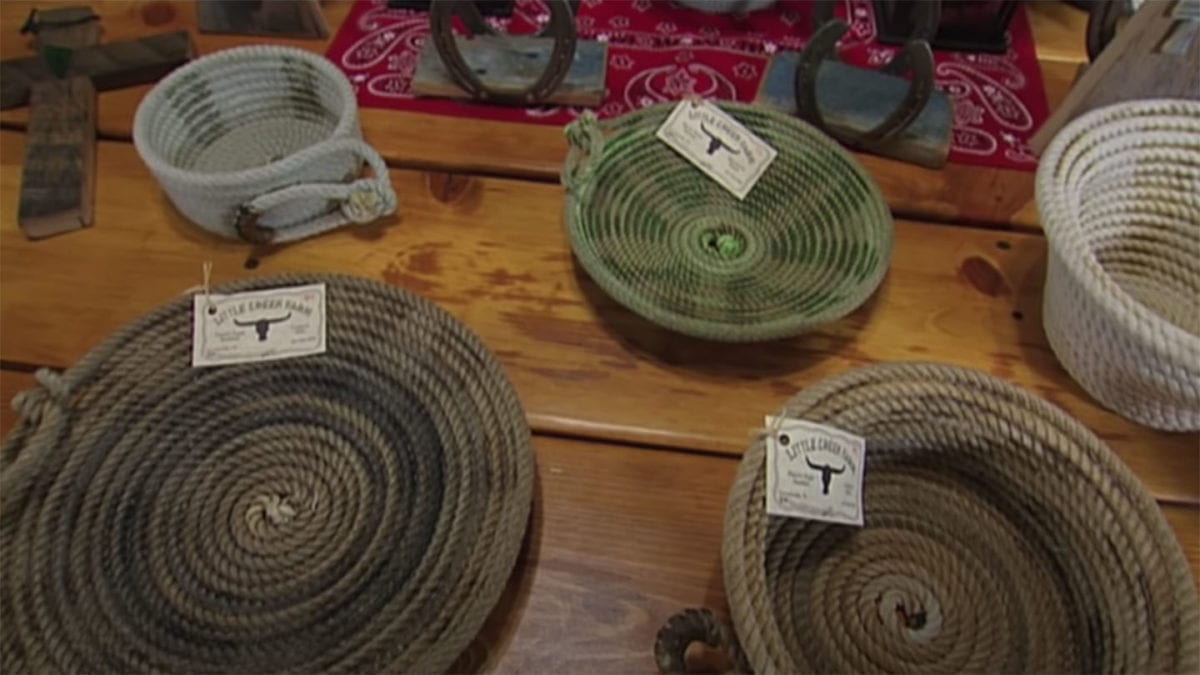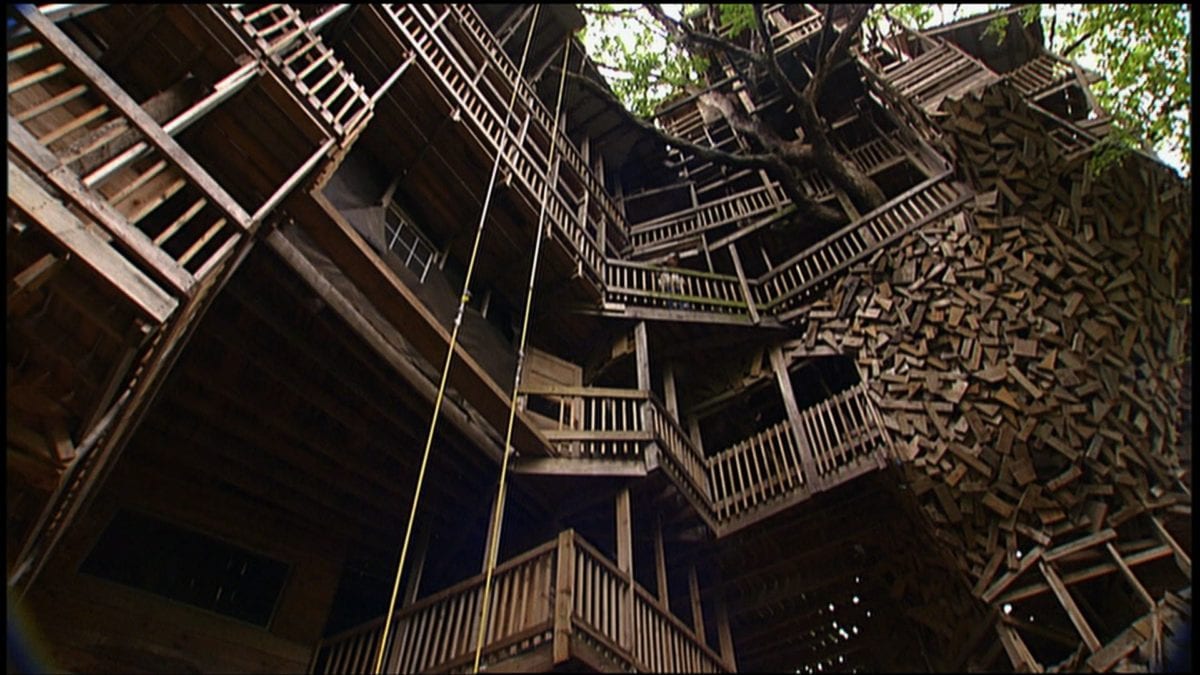- This time on "Tennessee Crossroads," we travel to Springfield to meet a specialist in salvage, then enjoy a delicious dip at the Dairy King in Nashville, we'll discover a farm to table store in Jonesborough and finally, profile an East Tennessee dulcimer maker which should make for a good show. I'm Joe Elmore. Welcome again to "Tennessee Crossroads." No doubt you've heard the old saying, "One man's trash is another man's treasure." Well that's especially true if you know exactly what to look for. Miranda Cohen found one such man with an eagle eye for antiques up in Springfield, a place where the doctor is always on the lookout for beautiful bargains.
- [Miranda] In the heart of Robertson Country, is a 36,000 square foot history lesson of sorts.
- People need to get outta the city and they need to come out to some of these little towns and stuff because they're just great.
- [Miranda] Doc Keys is the owner of Doc's Architectural Salvage and the treasures hidden within this two story warehouse are true gems.
- There's certain things when you see it, that you just fall in love with it. We get a lot of people, they'll come in and they'll say, "Well Grandma had this or Grandpa had this in their house."
- [Miranda] The Indianapolis native started working in the construction business with his father and immediately learned to recognize the quality of a bygone era.
- I worked with my pop all my life and he was just a master carpenter. He was a craftsman. You don't find that today. We worked in a lot of old houses. You know, my dad just taught me an appreciation for the old product, kinda stuck with me, and it's just, it's all fun.
- [Miranda] Doc has been full time in the salvage business for more than a decade. He buys mostly within a 600 mile radius. With his trained eye and keen sense of quality, he knows exactly what he's looking for.
- You look for houses that are, say, 1920s back. I look for tall doors. You know, it's just super fancy trim, stained glass, that type of stuff.
- [Miranda] What was so special about the workmanship back then?
- They took pride in it. It's just, I mean, pride's the word. Over the years I've become very particular on property that we'll salvage.
- Doc, everywhere you look in here there is something else incredible to see and obviously every piece has a story. So tell me about this amazing portrait of Abraham and Isaac.
- [Doc] What's cool about this is I had somebody actually call me from Southern Indiana, Southeastern Indiana, and said, "Hey, I know where this nice painting is. "It was in a lodge." It just hits you. It just gets you right to your heart there. It's just awesome. And look at his eyes.
- [Miranda] At Doc's Architectural Salvage, you will find a little bit of everything but he is particularly fond of lights and unique doors, with some dating back to the 1800s.
- It's getting so strong where people are coming in and buying so many doors and lights and putting them in houses and just finding out that, "Wow, does this ever make a difference."
- [Miranda] And he does have his favorites.
- I love nouveau pose lights. The lady lights. You know, you can tell a good one from a bad one by just the expression and the quality of their face. So they're just, I mean, they're awesome. I mean you just look at it, they're just mesmerizing.
- [Miranda] But Doc's finds don't always come in such pristine condition. Things that were once exquisite have often suffered from years of neglect. This chandelier from France was severely damaged in a house fire but Doc and his lighting expert, Sandra Humphrey, restored it to its original beauty.
- I let it sit back there for about a year and a half, asked Sandy, our lighting girl, I said, "Hey, you wanna take a challenge on "and try to get this thing clean," and I didn't know she was gonna take the whole thing apart 'cause I would never think about taking that puppy apart. And I walked in the lighting room and here it is, every arm, every crystal, everything is off of this thing. Wires are cut and I looked at her and I said, "Oh my goodness gracious." And she goes, "Oh I can get it back together."
- I asked him, can I take it apart. It deserves to come apart. And then he came in the next day and he was like, oh my gosh. But it turned out perfect.
- And I tell you what, you saw it when you first walked in here, is that just incredible?
- [Miranda] It's magnificent.
- [Doc] It's just, it's over the top.
- [Miranda] And for Doc's clients, thirsty for a little more adventurous nostalgia, Doc's large vintage bars are in high demand.
- You know, they're just cool. I mean, I like beer. It's just, you know, you go into a new bar and you're sitting there and all this shiny stuff and you go into an old bar, it's, you know, it's not as lit up as much and it's just, there's craftsmanship back there. And not everybody does the bars so it's just, it's a good niche for us.
- [Miranda] And with the help of the internet, Doc will chase things all over and sometimes, even he is surprised by what he finds, like this 200 year old wooden cupboard.
- It was just amazing. You pull those drawers out, and this was made in 18 something and I mean, dovetail drawers, and it's an old farmhouse cabinet. It's just incredible.
- [Miranda] And thanks to modern technology, Doc can also offer his vintage pieces to a vast audience.
- I put something on the internet and within 15 minutes, I had 172 people look at that product. And so you've actually got millions of people looking at that product. I just like saving it. I put my heart and soul into this for 10 years. And it's fun, I love coming to work every day.
- [Miranda] Doc Keys is a man on a mission, taught quality and a love for craftsmanship by his father, finding diamonds in the rough and long forgotten treasures in the hopes of bringing their exquisite beauty and attention to detail to a whole new generation.
- Thanks a lot, Miranda. Restaurants come and go as food fixations change. One study found that more than half of all restaurants close or get new owners within the first year of operation. So when Rob Wilds heard about a restaurant in Nashville going strong after more than 50 years, well, he knew he had to bend the knee to the Dairy King.
- The original Dairy King was probably built in the late 1940s and a bit later, was owned by Bill Harbison. In 1970, the Joneses, Thelma and Dudley, bought the place and everything was groovy until 1979. Then a major flood hit but Thelma and Dudley picked up, cleaned up, dried out and reopened. Things were great again until 2010. Floods couldn't dampen the Dairy King's spirit. The Jones family just packed up, moved to a new location here down the street from the old one and they brought with them all the important things, you know, like good food and friendly folks who could make you feel like you're part of the Jones family.
- Luckily, this building was available and it just kinda worked out for us. It was amazing the way it worked out but we got in here, we built the thing, and got open in around six and a half months. We opened in November of that year. That's moving right along. We were blessed. Here we go.
- [Rob] As Thelma and Dudley's son, Jeff Jones was there as the Dairy King's reputation was built.
- [Jeff] I got to go to work when I was 13 year old and, you know, I think my mom paid me 50 cents an hour and, you know, for a kid that wasn't bad. You know, I worked summers, I just worked all the time and all through school.
- [Rob] As things will go, Jeff's parents got older. Even though his mom continued to work here until right before she died.
- She would fry our flat cornbread and that's what she would do and every one was perfect. Every one was perfectly brown on both sides. She was the best. You know, and she'd come out and talk and sit down. She'd fry some bread, come out, and she was just a rock star. My dad too. His table was up on the corner and we called it the Liar's Table. We'd have the guys would come around and just sit and talk and tell stories. Well how's the retired life?
- [Rob] A role that has passed to Jeff, who seems to know many of the customers who come here.
- Hey guys! Come on in here. How are ya?
- [Rob] When Thelma and Dudley were gone, Jeff and his wife, Caroline, stepped in to keep the King going, even though it was tough following Thelma and Dudley.
- They were pillars of the community. When I was in school, you know, just very active. Just grateful. Did a lot of good work for a lot of people, helped a lot of people out. They just, they were amazing. I was fortunate to have them as parents. No doubt about it. Big shoes to fill. The product and the reputation preceded me.
- [Rob] Something else that preceded Jeff are employees who worked for his folks and now for him. Employees like Lausanita Gaines, who's worked here for more than a quarter century because, well, your food is her passion.
- When I was coming up, coming from the country, and, you know, back then, you know, you had to cook and learn how to do things. You know, and it just was a passion. My whole family, you know, they liked cooking, you know? And I just, I guess my mom, you know, and my dad and all of them, you know, they just enjoyed it and it's like a passion. You know, you got the feel for it. You just can't throw something in the pot and say that's cooking. You know, you got to have that feeling. You know what I'm saying?
- [Rob] I do know and you will too when you taste what comes from Lausanita's passion and Thelma Jones' recipes. Now the menu here has changed quite a lot since the early days when the Dairy King was really a hamburger stand. Serving things like-
- [Jeff] Chili dogs, you know, hamburgers and soft serve milkshakes and sundaes, you know, that's what they were. And that carried on, you know, through about the mid 70s and then, when everything hit here on Murfreesboro Road, and then my mom and dad took a pretty good hit. Americans no longer had to get out of their car to get a hamburger so she retooled and started doing what she loves to do which is cook Southern food and started out small with a bowl of white beans and cornbread and just grew into a full blown meat and three. We do, like, 10 veggies and three or four entrees five days a week.
- What vegetables would you like?
- [Customer] Green bean and-
- [Rob] If you've got a sweet tooth, there's one thing on the menu that will get your attention and keep it for a while.
- Basically, it's a turnover, like a peach turnover, or an apple turnover and then we dip it in a batter and deep fry it so the batter's flour and sugar, and it just really makes it crunchy and sweet and the pudding is incredible so it's just, people go crazy about those chocolate fried pies. I usually tell people, you have sign a disclaimer. We're not responsible for 12-step programs, chocoholic, not anything. If you eat this on your own accord. But yeah, my dad was, he was kinda like a crack dealer. I'll give you the first one free, you know? And then they'd be back, but anyway, he was a character.
- [Rob] Well, there you are. Dudley and Thelma's legacy lives on here at the King. One reason why Jeff and Caroline are happy to keep the place going.
- [Jeff] Carrying on the tradition and honoring my parents, I think was big and we just got so many repeat customers. Like we just, we shut down week after Christmas, you know, and I got people, "Well, I didn't eat for a week." You know, so we've got so many loyal customers, both in the area locally and also we've got folks that come in that work here in Nashville that don't live here and they either come for lunch or they'll swing by and get something to take it home.
- One's for here though, Peggy.
- [Rob] Eat it here, take it home, either way, you're likely to come back to pay your respects to the King as it moves into its next half century.
- Thanks, Rob. Next, our Keep Crossroads Traveling partner, Will Pedigo, visits a gas station that's been converted into a community owned store. It's up in Jonesborough, Tennessee. Here's how the Boone Street Market supports local farmers and food producers in Upper East Tennessee.
- The simplicity of farming your own land, growing your own food, possibly selling some to make a living is just a beautiful thought.
- [Will] Matt Dobson is making a go of running a small family farm in Telford, Tennessee. But after two years, he's learned first hand it's not easy.
- Well, I thought that moving back to Tennessee and transitioning into agriculture would be a more simpler life. It's a more sustainable life but when you tackle any set of issues, it's not simple. Family farming is quite difficult.
- [Will] Finding success means overcoming all the traditional barriers, startup costs, trial and error, understanding the plant and animal science, and balancing factors outside of your control like weather. But even if you make it to a finished product, the work isn't done.
- Farmers in general are so focused on what they're growing, how they're growing it, their practices, it's hard to think about what you're gonna do with it when you have it and the end result is to make a bit of profits, it's hard to focus on that and to make the homestead or the family farm work.
- [Will] In neighboring Jonesborough, Tennessee, Matt Dobson found he was not alone.
- Jonesborough's a awesome community. The word community gets thrown around a lot just to as a synonym for town or city, but it's really, it's rare these days.
- [Will] The community of Jonesborough took an organized approach to supporting their local farms and farmers when they created a non-profit called Jonesborough Locally Grown. Matt Dobson jumped on board and witnessed the non-profit grow from hosting a seasonal farmer's market to local farm to table dinners and in October of 2014, opening the Boone Street Market in downtown Jonesborough.
- The Boone Street Market only sells food produced or grown within 100 miles of Jonesborough. If you come to the Boone Street Market, you are directly effecting your neighbor and you're helping them pay their bills by consuming their product. We'll never be a one-stop shop. We're small and we know that. We just want you to come to us first and see what we have, see what you can buy local then go on about your grocery shopping habits and we understand that but we've tried to be as diverse with our product offerings as possible and that comes from the diversity of the food ideas in our region. So for the most part, we are fruit and vegetable heavy which is great 'cause that's what, the way the diet should be but we offer as broad a spectrum as we can. The greatest component of my job, through my eyes, is education. It's very important for us, Jonesborough Locally Grown and the Boone Street Market, to know where all the food comes from. We have visited the farms. We have talked to the farmers and learned their growing practices, where they do it and what they're doing. We have a map on the wall right now that has a radius of 100 miles from Jonesborough. There's red pins that represent farms and there's black pins that represents food producers. So it's a story that we can tell and it's a story that the customer can relate to.
- Everything sold in the Boone Street Market comes from within a 100 mile radius. Matt Dobson, on the other hand, came from another part of the world doing something that was anything but sustainable.
- [Matt] I was a golf course superintendent for 16 years. One of my last jobs in the golf business was in Dubai building golf courses in the middle of the desert. These weren't just golf courses. They were really a marvel of plant science. We took a thousand acres of desert and transformed it into championship golf courses using lots of water, lots of sand, lots of resources.
- [Will] Give us one example. What was the most unsustainable thing you did over there in that golf course?
- Well, the courses in Dubai, for example, used a bunker sand that was shipped from North Carolina. We shipped sand from the U.S. to a place that's made of sand for the playability of the bunker. Some good things came out of that. It was an excellent project but it changed me, personally and professionally, and led me to leave the game of golf and transition into small agriculture.
- [Will] Which is harder work? Building a championship golf course in the middle of the desert in Dubai or running a small family farm in Upper East Tennessee?
- They're both extremely difficult. Being profitable with a small family farm in East Tennessee's harder.
- [Will] With the Boone Street Market, Matt Dobson and Jonesborough Locally Grown, hope to make running a farm a little easier on farmers and their products a little more accessible for everyone.
- This market gives me a little bit of hope for small family farms. Every community that cares about their neighbors needs one of these and, you know, it's not a lot of startup. If the town's invested in the idea they can be a huge asset and there's farms all over the state of Tennessee and farmers will always need a place to sell product, consumers will always need to eat, and if we can keep our doors open, farmers will always have an outlet to sell their product that they worked hard on and the community will always have access to healthy, local food.
- Well finally, historians seem to disagree on what the first musical instrument was or when it was created, however one thing is certain, music has been instrumental in the development of mankind. Closer to home and much more recently, Ken Wilshire met a fellow in East Tennessee who continues a musical tradition of his own.
- [Ken] These beautifully handcrafted musical instruments are just like the ones used by our early American forefathers when they settled here in the mountains of East Tennessee. You'll find them displayed in the Wood-N-Strings Dulcimer Shop in Townsend. They're the inspirational creations of dulcimer maker, Mike Clemmer.
- I've always loved woodworking, I've always loved people, and I've always loved music.
- [Ken] And music is certainly what you'll find at Wood-N-Strings. It's Mike's shop here in the Smokey Mountains where he's been crafting dulcimers for about 40 years.
- In 1976, I started building some dulcimers with a friend. When I build one in '76, I figured I better learn how to play it and then that's what's happened since then.
- [Ken] And since then, he's learned well. Not only as he and his wife, Connie, accomplished musicians, Mike clearly understands the dulcimer's heritage and his responsibility in keeping it alive. You see, just like cornmeal and salt were staples of mountain settlers, music was an important part of their family life as well and the dulcimer was a popular choice.
- The dulcimer came from right here, Kentucky, West Virginia, Virginia, North Carolina, Northern Georgia, East Tennessee, all in the Appalachia. And I really believe that when people got here they wanted to do one thing first and that was build a home for their family. Then they built a home for their animals, you know, a barn, then they built a home for their God, and when they did that, they needed some music.
- [Ken] So the spiritual sounds of the dulcimer were perfect. Mike incorporates his extensive knowledge of its history when he designs and builds each one. He's even added his own unique sounds.
- I have an instrument that I've invented called the Ban-Jammer which is a, basically it plays like a dulcimer but it sounds like a banjo. I make what is known as a Clemro, for lack of any other word. We don't wanna get with Dobro problems, you know? I just call it Fred, you know. But you can also play it with a slide and get a lot of that Dobro type of sound.
- [Ken] Mike also builds a double neck instrument for two people to play. He calls it a Courting Dulcimer.
- The story goes, and I've actually researched this, that when the young man would come to court his young lady, Mom and Dad would put two chairs on the front porch and put this instrument between them and then they'd go inside to give them a little privacy. And as long as they heard two parts, they knew their hands were busy.
- [Ken] And Mike's hands are busy finding just the right wormy chestnut, walnut or hickory when he begins. He can almost hear the sound of his next dulcimer by simply thumping the wood.
- There's an old fiddle maker's trick, that you hold a piece of wood up and you'll thump it with the back of your knuckle and when it's about an inch thick or so, you can hear it. It'll go thump or it'll go bong. Okay, well thump makes a good shelf and bong makes a good instrument, you know, so what I do is I spend more time picking out my wood, honestly, than I do making the dulcimer because I found out that if you spend more time gathering the wood, the right wood, that you don't have to do so much to it in your shop.
- [Ken] Once Mike's shaped these wooden works of art to perfection, they're signed and commissioned to play.
- Sound does something to us. Music does something to us, and I don't care whether you're a teenager listening to the hardest rock you can or some sort of rap or something, or somebody listening to Lawrence Welk, it brings back memories and it's always good memories. You know, it's just one of things if you strum a little bit and play a song that you've actually created that, it's very fulfilling.
- [Ken] Mike says anyone can learn to play the dulcimer within a few minutes.
- And I have people come in here as young as seven or eight or some folks in their 90s, and have never ever played an instrument in their life and can actually sit down and play two or three songs within the first few minutes. It's a wonderful thing to see that light in their eye. So you don't have to pay an arm and a leg to have a lot of fun and you don't have to take years and years and years of lessons to play. Matter of fact, I'm gonna set you down. You are, you're gonna play before we finish this. Well Mike welcomed the opportunity to show me a few chords, and he even trusted me with one of his brand new dulcimers. Are we ready?
- Oh, we're ready. Now what you need to do is when we're all playing most of the time, you just play all the strings open.
- Okay.
- Yeah, now you noticed we played a different chord every now and then? All you have to do is take your finger and go across that on the third one right there. That's it.
- All righty. Meanwhile, the Durst family from Kansas stopped by the shop to visit with Mike. They had been waiting patiently behind the scenes and what a surprise they were. It was almost magical. One by one the stair step ensemble gathered the instruments and suddenly, it was an improve jam session and I was invited to play. It's amazing. We were all total strangers but for the few minutes we shared together, we were one big family and nothing else in the world really mattered. Well, other than strumming in rhythm and hitting the third fret on the right beat. So thanks to Mike and Connie for their love of making and encouragement for playing these homespun instruments. Thanks also for keeping a precious part of Tennessee history alive and for giving a warm, welcoming place in these beautiful mountains to experience it all.
- That's great.
- Good job.
- Well that's gonna do it for this edition of "Tennessee Crossroads." Time to go but not before the usual reminder to check out our website, TennesseeCrossroads.org, follow us on that thing called Facebook and join us next week.

